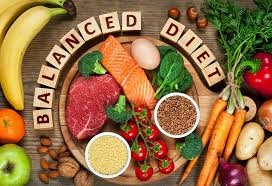Ivm304
Others : Am Gabriel Joshua By Name And Am The Founder Of Www.naijadropes.tk Blog
Articles
4
Followers
1
profile/5231FB_IMG_159567521997976232.jpg
Ivm304

10 Tip To Leave A Healthy Lifestyle
~5.3 mins read
10 Healthy Lifestyle Tips for Adults
• Eat variety of foods.
• Base your diet on plenty of foods rich in carbohydrates.
• Replace saturated with unsaturated fat.
• Enjoy plenty of fruits and vegetables.
• Reduce salt and sugar intake
Eat regularly, control the portion size.
• Drink plenty of fluids.
• Maintain a healthy body weight.
• Get on the move, make it a habit!.
• Start now! And keep changing gradually.
1. Eat a variety of foods
For good health, we need more than 40 different nutrients, and no single food can supply them all. It is not about a single meal, it is about a balanced food choice over time that will make a difference!
A high-fat lunch could be followed by a low-fat dinner.
After a large meat portion at dinner, perhaps fish should be the next day’s choice.
2. Base your diet on plenty of foods rich in carbohydrates
About half the calories in our diet should come from foods rich in carbohydrates, such as cereals, rice, pasta, potatoes, and bread. It is a good idea to include at least one of these at every meal. Wholegrain foods, like wholegrain bread, pasta, and cereals, will increase our fibre intake.
3. Replace saturated with unsaturated fat
Fats are important for good health and proper functioning of the body. However, too much of it can negatively affect our weight and cardiovascular health. Different kinds of fats have different health effects, and some of these tips could help us keep the balance right:
We should limit the consumption of total and saturated fats (often coming from foods of animal origin), and completely avoid trans fats; reading the labels helps to identify the sources.
Eating fish 2-3 times a week, with at least one serving of oily fish, will contribute to our right intake of unsaturated fats.
When cooking, we should boil, steam or bake, rather than frying, remove the fatty part of meat, use vegetable oils.
4. Enjoy plenty of fruits and vegetables
Fruits and vegetables are among the most important foods for giving us enough vitamins, minerals and fibre. We should try to eat at least 5 servings a day. For example, a glass of fresh fruit juice at breakfast, perhaps an apple and a piece of watermelon as snacks, and a good portion of different vegetables at each meal.
5. Reduce salt and sugar intake
A high salt intake can result in high blood pressure, and increase the risk of cardiovascular disease. There are different ways to reduce salt in the diet:
When shopping, we could choose products with lower sodium content.
When cooking, salt can be substituted with spices, increasing the variety of flavours and tastes.
When eating, it helps not to have salt at the table, or at least not to add salt before tasting.
Sugar provides sweetness and an attractive taste, but sugary foods and drinks are rich in energy, and are best enjoyed in moderation, as an occasional treat. We could use fruits instead, even to sweeten our foods and drinks.
6. Eat regularly, control the portion size
Eating a variety of foods, regularly, and in the right amounts is the best formula for a healthy diet.
Skipping meals, especially breakfast, can lead to out-of-control hunger, often resulting in helpless overeating. Snacking between meals can help control hunger, but snacking should not replace proper meals. For snacks, we could choose yoghurt, a handful of fresh or dried fruits or vegetables (like carrot sticks), unsalted nuts, or perhaps some bread with cheese.
Paying attention to portion size will help us not to consume too much calories, and will allow us to eat all the foods we enjoy, without having to eliminate any.
Cooking the right amount makes it easier to not overeat.
Some reasonable serving sizes are: 100 g of meat; one medium piece of fruit; half a cup of raw pasta.
Using smaller plates helps with smaller servings.
Packaged foods, with calorie values on the pack, could aid portion control.
If eating out, we could share a portion with a friend.
7. Drink plenty of fluids
Adults need to drink at least 1.5 litres of fluid a day! Or more if it's very hot or they are physically active. Water is the best source, of course, and we can use tap or mineral water, sparkling or non-sparkling, plain or flavoured. Fruit juices, tea, soft drinks, milk and other drinks, can all be okay - from time to time.
8. Maintain a healthy body weight
The right weight for each us depends on factors like our gender, height, age, and genes. Being affected by obesity and overweight increases the risks of a wide range of diseases, including diabetes, heart diseases, and cancer.
Excess body fat comes from eating more than we need. The extra calories can come from any caloric nutrient - protein, fat, carbohydrate, or alcohol, but fat is the most concentrated source of energy. Physical activity helps us spend the energy, and makes us feel good. The message is reasonably simple: if we are gaining weight, we need to eat less and be more active!
9. Get on the move, make it a habit!
Physical activity is important for people of all weight ranges and health conditions. It helps us burn off the extra calories, it is good for the heart and circulatory system, it maintains or increases our muscle mass, it helps us focus, and improves overall health well-being. We don't have to be top athletes to get on the move! 150 minutes per week of moderate physical activity is advised, and it can easily become part of our daily routine. We all could:
use the stairs instead of the elevator,
go for a walk during lunch breaks (and stretch in our offices in between)
make time for a family weekend activity
10. Start now! And keep changing gradually.
Gradual changes in our lifestyle are easier to maintain than major changes introduced all at once. For three days, we could write down the foods and drinks we consume throughout the day, and make a note of the amount of movement we made. It won’t be difficult to spot where we could improve:
Skipping breakfast? A small bowl of muesli, a piece of bread or fruit, could help slowly introduce it into our routine
Too few fruits and vegetables? To start with, we can introduce one extra piece a day.
Favourite foods high in fat? Eliminating them abruptly could fire back, and make us return to the old habits. We can choose low fat options instead, eat them less frequently, and in smaller portions.
Too little activity? Using the stairs daily could be a great first move.
Drop a comment. www.naijadropes.tk
profile/5231FB_IMG_159567521997976232.jpg
Ivm304

Balanced Diet
~1.8 mins read
BALANCED DIET:
A balanced diet is a diet that gives your body all the nutrients required by it in order to function correctly. Appropriate knowledge and lifestyle modification play a key role in guiding you for maintaining a balanced diet chart and healthy life ahead. A balanced diet is important because the organs and tissues in the human body need adequate nutrition to work effectively.
To get the proper nutrition from your diet , a variety of food choices from each of the six food classes--- carbohydrate, protein, vitamins, fats, minerals and water --- is required. Foods like fresh fruits, vegetables, whole grains, legumes, nut, and lean proteins fall into different categories of the food classes.
Fruits are a great source of nutrition. They are vital sources of vitamins and minerals; hence, they should make up one-third of the food you eat each day.
Vegetables are primary sources of essential vitamins and minerals. Leafy green contain greet and can be eaten at every meal. A variety of it will help you obtain the abundant nutrients that all vegetables provide. It is advisable to eat a variety of fruits and vegetables every day. Meat and beans are primary sources of protein, essential for proper muscles and brain development . Dairy products like milk and cheese provide calcium, vitamin D, and other essential nutrients.
Nutritionists also emphasied that eating well can also help ward off numerous diseases and health complications, as well as help maintain a healthy body weight, provide energy, and allow better sleep. Endeavor to take foods that are low in unnecessary fats and sugar , but high in vitamins, minerals, and other nutrients.
Without good nutrition,y body is prone to diseases, infections, fatigue, and poor performance. Children with poor diet runs risk of growth and development problems and poor academic performance. The United States department of agriculture (USDA) reporta that four of the top 10 leading causes of death in the U.S they are directly influenced by diet.
These are heart disease, cancer, stroke, and diabetes. So you should abstain from junks, Junks ---- also known as fast food --- are highly processed and contain a lot of calories. When fast food frequently replaces nutrition foods in your diet, it can lead to poor nutrition, it can lead to poor nutrition, weight gain, and poor health. So avoid them as much as possible so that you can balance your diet and live a healthy life.
Advertisement

Link socials
Matches
Loading...
